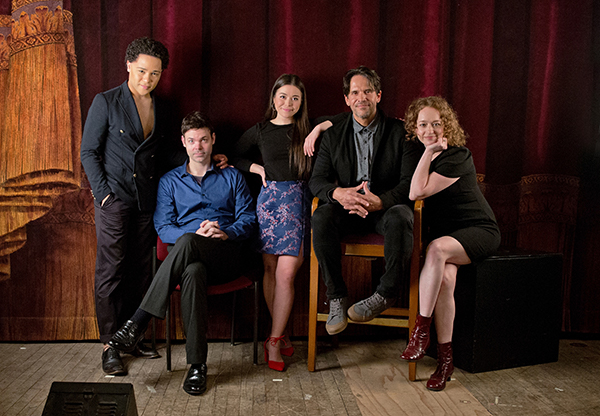 Production still from "Oslo." Photo by Chris Bennion.
Production still from "Oslo." Photo by Chris Bennion.
In 2003, it looked as if ACT Theatre might join a series of beloved Seattle theatres that closed around that time. Yet here you are in 2019, thriving and debt-free. How are you celebrating? (I hope you’re celebrating.)
We’re celebrating by thanking people.
When former trustees hear the news, I’ve seen tears form in their eyes. People care so deeply for ACT, and for the theatre to have one less hurdle is a relief for those who know the challenges we face. Whether individuals have been with us for five months or 53 years, they know that everyone plays a role in making ACT’s operation and existence possible.
When we announced the debt retirement plan at a staff meeting earlier this year, the room erupted in cheers. Eliminating the debt saves ACT the annual interest payments. Less debt service equals more investment in the art, and that is something to celebrate as well.
Now is the time for thank you notes and planning so that we stay out of debt and strengthen our position. ACT operates without significant cash or capital reserves, and our endowment is modest at $2 million. We don’t have a large margin of error. So, we can celebrate for a minute, but we cannot rest or take anything for granted.
 "The Wolves" photo by Chris Bennion.
"The Wolves" photo by Chris Bennion.
What were some key drivers of your recovery? Those close to ACT know that it has navigated financial hurdles over the years and has needed to borrow in one form or another for decades. The recovery started 15 years ago when the problem of having a structural deficit was consuming the organization. The baton of responsibility has been continually passed and our leadership now has the duty to keep it going. Here are four key drivers to our recovery:
Leadership + Vision: Board and staff leadership must be in alignment if a plan has any hope of being accomplished. Our recovery goes back to the board and staff leaders who led the turnaround in 2003, to those who invested in the company through the recession giving it room to breathe, to those who helped ACT to adapt to the needs of its new, yet historic facility, and to those who developed innovative programs like the ACTLab and ACTPass. The board and staff were aligned towards a big vision to make ACT a vibrant and vital part of this community. The same and more are part of ACT’s strategy today. Our Strategic Planning work is focused on a three-year cycle working towards a longer-term vision to the year 2025, which is the Centennial of our historic landmark home, the 60th Anniversary of ACT, and the 50th Anniversary of our adaption of A Christmas Carol. With Leadership and Vision, I am confident we can accomplish great things by that milestone year.
Value: You must have a broad base of loyal supporters and to do that you have to serve your community. That community must believe in your mission and we are fortunate to have a community of people who value contemporary theatre. One of our points of pride is that we are 98% local. From actors, directors, designers, carpenters, electricians, and staff, ACT has relationships with its family of artists in the Seattle/Puget Sound region and we support the creative economy and provide jobs. Audiences have developed affection for the artists and staff over our five decades. Our venues are intimate, so the connection between the theatre artists community and audiences is powerful. In 2007 ACT also opened its doors to the greater community by creating the ACTLab. With four stages and multiple event spaces, we have the facility resources needed to give other artists and organizations a home to perform and partner with. Our value and identity are now linked as a hub for live theatre and a home to hundreds of artists working in a variety of forms. As one patron recently said, “We think ACT brings value to the community and we are proud to support it.” If we can continue to bring value to the community, we will continue to fulfill our mission.
Support: The loans we had were necessary at the time and we’re grateful to those who trusted us with their resources. A few years ago, ACT’s closest supporters pledged to help retire the debt and establish funds needed for urgent capital improvements. Those commitments were critical to helping us pay off loans and reduce our dependency on our line of credit. Now, we are in a Stabilization Initiative and we have both long-standing and newer funders who are dedicated to making sure that we stay as far away from the need to borrow as possible, while still producing theatre at a scale that excites our audiences and adheres to our mission.
Financial Discipline: ACT’s Board Finance Committee adopted a funds use policy and budgeting principles that have helped the theatre to develop the discipline necessary to operate sustainably. Our Director of Finance was instrumental in making sure the staff understood the value of a balanced budget and has been a dependable partner for me as we work to build solid budgets and cash flow projections. Every department, not just the revenue generating ones, know their role in meeting financial goals. Early in 2018, we established a Debt Retirement Task Force of current and past Trustees who helped formulate a plan for ACT to eliminate the debt. This group of leaders were tremendous partners in bringing the plan to completion. As one of them quoted to me, “Good luck comes to those who plan.”

ACT’s 2018 Core Company photo by Dawn Schaefer.
How do you see this financial recovery linked with your commitment to EDI?
It has been an honor to participate in TCG’s EDI Institute for the past three years. The learnings we’ve gained from the trainings and peer sharing has been invaluable. Thank you, TCG, for bringing us together to address the systemic inequities in our field and to unite us in being a vehicle for positive change in the world. In doing this work we recognize that there are privileges that ACT has benefited from throughout our 54-year history, specifically related to access to wealth.
Since 2016 when John Langs became Artistic Director and we defined our goals for ACT’s second half-century, we started the journey of becoming a more equitable, diverse, and inclusive organization. While we are working on a variety of ways to remove barriers to access, racial equity is a primary focus. We strive to better represent the racial diversity of our community on our board, staff, artists, and audiences. While the demographics of our population in Seattle are not nearly as diverse as other metropolitan areas, we know that we can make changes to be more inviting and to represent the greater community. Being anti-racist and knowing what that means in relation to the field of theatre in America is an important and critical beginning.
It starts with what we program on stage, whose stories are told, who tells them, and how we support and engage our full community. If we’re not approaching our work with an equity lens, then we are not fulfilling our mission as a not-for-profit.
Our work with TCG’s Institute also cemented the reality that lasting change must come from the top. As Managing Director, when I renewed my contract last year, I asked the Board to make a commitment to ED&I work from within the Board, I asked that we commit to professionally facilitated strategic planning, and I asked that the Managing and Artistic Director compensation be equal. Without hesitation they said, “Yes.” That was huge. The leaders of the organization have said yes, we will make this a priority, yes, we will make a long-term financial and resource commitment, and yes we will do the work with you. I’m proud to say that our current Strategic Plan is being developed with an equity lens on each objective as well as its own category.
One of our planning survey responders from our audience said, “you’ve made progress, but you can do better.” I agree. And I’m glad our customers are demanding greater results from us, too.

ACT’s Building photo by NXT Creates.
You also inherited a different kind of debt when you joined ACT. Can you talk about how you brought healing when you learned of past harm?
An organization can only be inclusive if people feel safe. One of our values is transparency and creating an open and honest culture. One of the national #MeToo articles reported on a former ACT Artistic Director. When we learned that there was abusive behavior in ACT’s past and that 15-20 years had gone by without it being addressed, we reached out to those we knew were impacted to offer our support. We also invited staff who were at ACT during that time to report incidents they were aware of so that they could be properly documented in our employee files.
It is our responsibility to take preventive measures, including educating and informing our staff, from the green room to rehearsal room to copy room, that harassment is not tolerated at ACT. We employ 100 people annually and they all deserve a safe place to work. Standard practice now is that every ACT employee and guest artist must sign an agreement to acknowledge they understand and will abide by our code of conduct and harassment policies. We’ve worked to create clear messaging about what is considered unlawful harassment and to provide training with examples of behavior that is not acceptable. Additionally, everyone needs to be clear that retaliation is illegal, and no one should fear retaliation as a consequence of reporting an incident.
In all of this work the learning is endless. Perhaps not perfectly, but we’ve made progress, our intentions and values are authentic, and we keep learning along the way. We’re working towards a big vision, one that affirms a culture of safety and welcoming for everyone.
#ACTTheatre#Seattle#FinancialPlanning#MissionClarity#EDI#MeToo#Healing#RetiringDebt